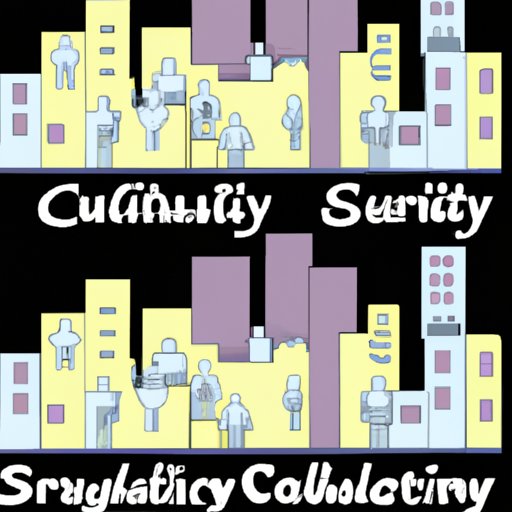Introduction
Cultural capital is a term used to describe the intangible assets that are associated with an individual’s culture and upbringing. These assets can include knowledge, skills, values, beliefs, and experiences that are passed down from generation to generation. Cultural capital can be acquired through formal education, family, or social networks and has the potential to shape a person’s life outcomes and opportunities.
The concept of cultural capital was first introduced by French sociologist Pierre Bourdieu in his book “Distinction: A Social Critique of the Judgment of Taste” (1979). According to Bourdieu, cultural capital is a form of capital that can be converted into economic capital or social capital, which in turn can be used to acquire other types of capital. He argued that cultural capital is an important factor in determining who succeeds and fails in society and that it can provide individuals with social advantages.

Examining the Benefits and Challenges of Cultural Capital
Cultural capital can be beneficial in a variety of ways. It can give individuals access to resources and opportunities that may not otherwise be available to them. For example, having access to books, art, and music can open up a world of possibilities and enrich one’s life in ways that may not have been possible without this kind of exposure. Additionally, cultural capital can provide individuals with a sense of belonging and identity, as well as a connection to their culture and heritage.
However, cultural capital can also be a source of inequality. Those who possess cultural capital may have an advantage over those who do not, leading to disparities in educational attainment, job opportunities, and social status. This can lead to a cycle of poverty and disadvantage for those without access to cultural capital. As Dr. Kirsten Drotner, professor of media and communication studies at the University of Southern Denmark, explains, “We need to think critically about how cultural capital is distributed and how it shapes people’s lives.”

Analyzing the Role of Cultural Capital in Education and Career Development
Cultural capital can play an important role in education and career development. Having access to cultural resources can provide individuals with the opportunity to develop the skills and knowledge necessary to pursue higher education and professional careers. The ability to speak multiple languages, understand complex concepts, and engage in critical thinking can help individuals excel in school and open up new pathways to success.
A study conducted by the American Educational Research Association found that students from families with greater cultural capital were more likely to complete college and earn higher salaries than their peers from less privileged backgrounds. The researchers concluded that “cultural capital is a powerful resource for students, enabling them to achieve greater educational and occupational success.”
Investigating How Cultural Capital Influences Social Mobility
Cultural capital can also have an impact on social mobility. Social stratification is a term used to describe the hierarchical division of society into different classes based on income, wealth, education, occupation, and other factors. Those with greater levels of cultural capital tend to occupy higher positions in the social hierarchy, giving them access to greater economic and political opportunities.
In her book “The Power of Privilege: How Cultural Capital Shapes Social Class” (2012), sociologist Mary C. Waters explored the relationship between cultural capital and social class. She argued that those with greater levels of cultural capital are more likely to rise to the top of the social ladder and enjoy greater levels of social privilege. She concluded that “cultural capital is a key factor in determining who succeeds and fails in society.”
Evaluating the Impact of Cultural Capital on Social Class
Cultural capital can also have an impact on social class. Those with greater levels of cultural capital are more likely to succeed in school, find good jobs, and accumulate wealth. This can lead to a cycle of privilege and power, as those with greater levels of cultural capital become increasingly influential in society. This can result in a widening of the gap between the rich and the poor and can limit opportunities for those without access to cultural capital.
As sociologist Ruth Sidel observes in her book “Women and Children Last” (1987), “The unequal distribution of cultural capital reinforces existing power structures and further marginalizes those without access to it.”

Understanding the Relationship Between Cultural Capital and Cultural Differences
Cultural capital can also contribute to cultural differences. Those with greater levels of cultural capital may have a greater understanding of their own culture and may be less aware of the cultures of others. This can result in a lack of appreciation and understanding for other cultures and can lead to cultural blindness.
At the same time, cultural capital can also lead to cultural prejudice. Those with greater levels of cultural capital may view those with less as inferior or less capable. This can lead to discrimination and exclusion, making it difficult for those without access to cultural capital to succeed in society.
Conclusion
In conclusion, cultural capital is an important factor in determining who succeeds and fails in society. It can provide individuals with access to resources and opportunities that may not otherwise be available to them, while simultaneously creating disparities in educational attainment, job opportunities, and social status. Cultural capital can also have an impact on social mobility, social class, and cultural differences, resulting in power structures that further marginalize those without access to it.
It is important to recognize the role that cultural capital plays in society and to take steps to ensure that everyone has access to the resources and opportunities that they need to succeed. By doing so, we can create a more equitable and just society for all.
(Note: Is this article not meeting your expectations? Do you have knowledge or insights to share? Unlock new opportunities and expand your reach by joining our authors team. Click Registration to join us and share your expertise with our readers.)
